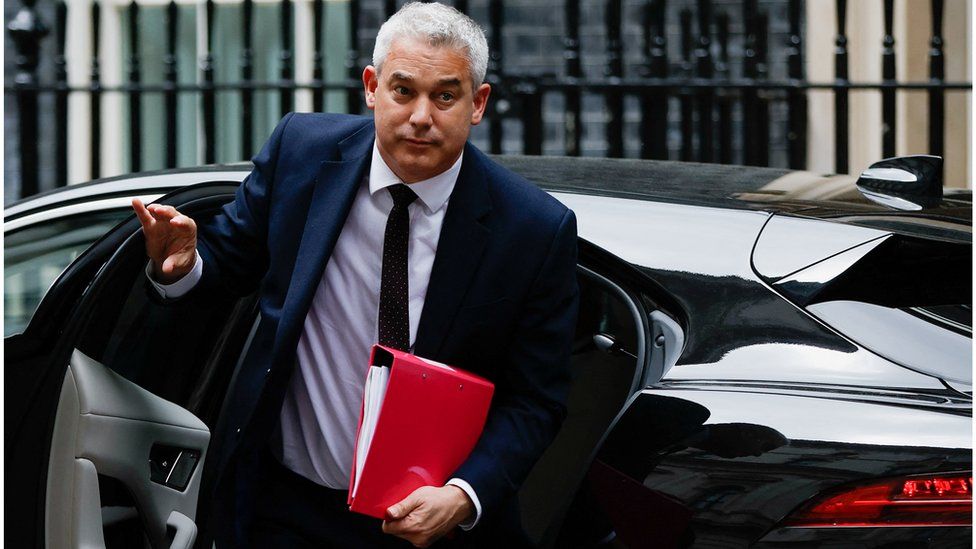ARTICLE AD BOX
By Jim Reed
Health reporter
 Image source, Reuters
Image source, Reuters
Steve Barclay has been named as the new health secretary following the resignation of Sajid Javid, who stepped down after saying he had lost faith in Boris Johnson's leadership.
Mr Barclay had been working as the chief of staff at No 10, a powerful role in which he advised the prime minister and managed the machinery of government.
Before that, he was chief secretary to the Treasury, a Brexit minister and served for a short while as a junior health minister in 2018.
Delighted to be back at @DHSCgovuk taking up the role of Health & Social Care Secretary.
Looking forward to working with fantastic @NHSEngland & social care staff.
Together we will beat the Covid backlogs, boost patient access & ensure health services deliver for everyone. https://t.co/PaFG8QzmU8
The BBC is not responsible for the content of external sites.View original tweet on Twitter
He starts as secretary of state at a time when the NHS and social care in England are under serious pressure.
Amanda Pritchard, the head of NHS England, has warned that the next two years could be even tougher for the health service than the two years since the start of the pandemic.
NHS Providers, which represents hospitals and other NHS trusts, described the problems Mr Barclay faces on his first day in the job as "big and pressing".
At the very top of that list is a record backlog for planned operations.
Nearly 6.5 million people, or one in nine of the population of England, are currently waiting for routine surgery, such as hip and knee replacements or cataract removal.
NHS England says there are signs of progress, with the number waiting more than two years falling and fewer patients having to wait for diagnostic tests.
But there is real uncertainty about the next two years, with some projections showing waiting lists increasing to more than 10 million by 2024.
A&E departments and ambulance services are also very stretched at the moment, with paramedics often facing long waits to unload patients at English hospitals.
The average ambulance response time for a category two emergency, such as a heart attack or stroke, was almost 40 minutes in May - more than twice as long as the 18-minute target.
A&E doctors say the problem is often caused by long delays discharging patients from hospital wards into residential care homes, or arranging a home care package.
The amount people have to pay for social care in England is set to change from October 2023.
But how this new system will work in practice, and whether it will be enough to tackle what health think tank the King's Fund describes as "deep-rooted problems" in the care sector, remains to be seen.
Image source, Reuters
Image caption,Steve Barclay (right) with Boris Johnson in Downing Street
The NHS is one of the biggest single employers in the world with 1.4 million staff. Another 1.6 million people work in social care, normally for private companies.
Mr Barclay will have to deal with demands for significant pay rises this year, at a time when inflation is running at 9.1% and is expected to climb further.
Two independent pay review bodies will soon make recommendations to the government on increases for most NHS staff.
But the final decision will be up to ministers, and Mr Barclay can expect some bruising battles with unions if that pay offer is below a level seen as acceptable.
As a former chief secretary to the Treasury, he will be familiar with complex public spending detail and demands for more money from health lobby groups.
But the government also needs to plug a huge hole, estimated at 105,000, in the NHS workforce, with acute shortages of GPs, nurses, hospital doctors and dentists.
Balancing those demands at a time when public spending is constrained is unlikely to be straightforward.
All this comes in the shadow of the biggest public health crisis of recent times.
The number of people in hospital after testing positive for Covid is now well below the levels seen at the peak of the pandemic.
But infections have started rising recently across much of the country, driven by the BA.4 and BA.5 variants of Omicron, and that is starting to be reflected in the numbers in hospital and intensive care.
NHS Trusts have warned they face a "bumpy ride" over the next few months with a "very real risk" that Covid might throw plans to reduce those NHS waiting lists off course.
Mr Barclay will also have to manage the rollout of the autumn Covid booster, and tackle a possible resurgence of seasonal flu and other winter pressures.

 2 years ago
32
2 years ago
32








 English (US) ·
English (US) ·